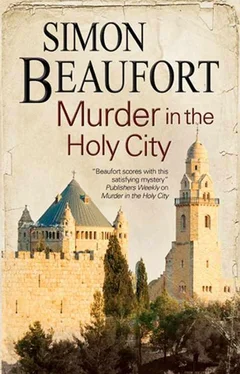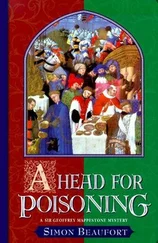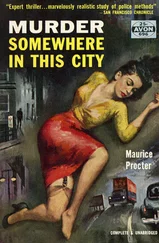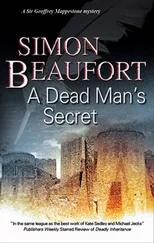Simon Beaufort - Murder in the Holy City
Здесь есть возможность читать онлайн «Simon Beaufort - Murder in the Holy City» весь текст электронной книги совершенно бесплатно (целиком полную версию без сокращений). В некоторых случаях можно слушать аудио, скачать через торрент в формате fb2 и присутствует краткое содержание. Год выпуска: 0101, Жанр: Исторический детектив, на английском языке. Описание произведения, (предисловие) а так же отзывы посетителей доступны на портале библиотеки ЛибКат.
- Название:Murder in the Holy City
- Автор:
- Жанр:
- Год:0101
- ISBN:нет данных
- Рейтинг книги:3 / 5. Голосов: 1
-
Избранное:Добавить в избранное
- Отзывы:
-
Ваша оценка:
- 60
- 1
- 2
- 3
- 4
- 5
Murder in the Holy City: краткое содержание, описание и аннотация
Предлагаем к чтению аннотацию, описание, краткое содержание или предисловие (зависит от того, что написал сам автор книги «Murder in the Holy City»). Если вы не нашли необходимую информацию о книге — напишите в комментариях, мы постараемся отыскать её.
Murder in the Holy City — читать онлайн бесплатно полную книгу (весь текст) целиком
Ниже представлен текст книги, разбитый по страницам. Система сохранения места последней прочитанной страницы, позволяет с удобством читать онлайн бесплатно книгу «Murder in the Holy City», без необходимости каждый раз заново искать на чём Вы остановились. Поставьте закладку, и сможете в любой момент перейти на страницу, на которой закончили чтение.
Интервал:
Закладка:
He wondered whether crawling up the Via Dolorosa on bleeding knees, or stopping after every step to pray, would really atone for some of the foul acts to which some of these pilgrims were confessing. One man with an unkempt black beard was demanding redemption for murdering his children when he was drunk, and doing so in tones that were anything but repentant. Meanwhile, a woman begged that her husband be struck dead before he discovered how many times she had committed adultery and killed her.
Geoffrey found his answer to the question of redemption in the Church of the Holy Sepulchre itself, which thronged with people, nearly all of them wearing smug expressions in the belief that their sins were forgiven and that they were free to go and sin again. Outside, beggars sat, revealing weeping sores, stumps of limbs, and fingers and toes eaten away by leprosy. Their chorus of demands as the knights entered the church rose furiously, and then turned into curses when Geoffrey’s handful of small coins-all he ever carried with him-did not meet their expectations.
The church had been built during the last twenty years, after an older one had been destroyed in an Arab raid. It comprised a handsome dome, not as impressive as the cupola of the Dome of the Rock, but pleasing in its sturdy simplicity. Under the dome was the tomb itself, a small hollow in a rock, around which pilgrims clustered like flies, their hands reaching out to touch.
This church had none of the reverent peace of the Dome or the little church of St. Mary’s: a constant babble of voices shattered the silence, wheedling, pleading, demanding, urging, fervent, jubilant, saintly, and ecstatic. Monks chanted constantly, different psalms and prayers for different Orders, all clashing and competing with each other. To one side, a man announced that he had fresh figs to refresh pilgrims weary after their ordeal, while a pardoner offered to sell Geoffrey pieces of the True Cross and hairs from Joseph’s beard that would assure his salvation. Geoffrey’s dog growled menacingly at the affray, and Geoffrey, knowing that it would be only a matter of time before it found someone to bite, pushed it outside to lie in the shade.
A Benedictine with a pronounced limp came forward to tell them that weapons were not allowed in the Church, and that they would need to leave their arsenal of swords and daggers outside.
“We are not here to make trouble, but we are not here as pilgrims,” said Geoffrey. “I want to talk to whoever discovered Loukas, the monk who was murdered last night.”
The monk’s eyes narrowed. “Who are you, and why do you make such demands?”
“We are here in the name of the Advocate,” said Geoffrey politely, wondering how long his good manners would last if forced to deal with yet more offensive monastics. “Please tell us where we might find the witnesses to Loukas’s murder.”
The monk sized them up for a moment and then, limping, led them away from the dome and along a stone corridor with rooms leading off it. He stopped at one, gestured that they were to wait in the hallway, and slipped inside, closing the door behind him. The entrance opposite was ajar, and Geoffrey pushed it open curiously. It revealed a small chapel filled with tiny burning candles that illuminated it with an unsteady light. Two sheeted bodies lay side by side in front of a rough altar, and several monks knelt next to them, droning prayers. They looked up as he entered, and their voices faltered and then stopped.
Geoffrey walked over to one of the corpses and lifted the sheet to look underneath. The white face of John of Sourdeval stared back at him, his hair washed and neatly combed and the blood rinsed from his body. Geoffrey’s stomach lurched as he looked into the face of the man who had been a friend. He stood for a moment, gazing down at the waxen features, memories of many evenings of discussion and debate flooding unbidden into his mind.
He swallowed hard and, muttering a silent apology to John, quickly pushed the body onto its side and measured the wound in John’s back against his own forefinger. He eased him down again and replaced the sheet gently, ignoring the half-curious, half-outraged stares of the monks. He turned his attention to the other body.
The man who lay there was small, and even in death his twisted and malformed limbs indicated a hunchback. His face was swarthy too, and although someone had carefully washed and shaved the body, there was a heavy growth of stubble on his chin and cheeks. Assuming it was Loukas, Geoffrey eased the body over, and noted that the gash in its back still oozed a little. He laid his finger next to it, noting that it was longer than the one in John’s back. But that meant nothing, for he knew that such wounds could be enlarged if the victim struggled, or fell awkwardly.
“What do you think you are you doing?” came a sharp voice in aggrieved tones. “These men have been prepared to meet God. They died unshriven, and so we must do all we can to ensure their souls reach Him. Your poking and prodding will not help them.”
Geoffrey smiled an apology at the surly monk who had ordered him to wait in the corridor, and followed him out of the chapel and into the room opposite. Roger was already seated with a goblet of wine, and Helbye and Fletcher stood to attention behind him.
“This is Father Almaric, who rules the Benedictine community here,” said Roger, introducing Geoffrey to the white-haired monk who rose to greet him with a benign smile. “And this here is his secretarius Brother Celeste,” he added, eyeing the sharp-voiced monk who had escorted Geoffrey from the chapel with dislike.
Father Almaric offered Geoffrey some wine, and then sat again with evident relief. “Forgive me,” he said, “but I have swollen ankles that give me much discomfort. Standing is most painful.” He took a grateful sip at the rich red wine in his cup. Geoffrey watched him.
“The Arab physicians say that swollen ankles might be aggravated by red wines,” he said. “They recommend sufferers to drink white wines or, better yet, ale or water. And they say a poultice of mud from the Dead Sea brings some relief.”
Almaric looked startled at this turn in the conversation.
“Take no notice of him, Father,” said Roger comfortably. “He reads all the time and talks to these infidels in the language of the Devil, so it is no wonder that his head is stuffed with such nonsense. I always find red wine soothes pains better than white.”
“Does it work, this Arab treatment?” asked Almaric, ignoring Roger.
Geoffrey smiled. “I have no idea-I have never suffered from the complaint. I only repeat what I have read.”
Almaric looked at the wine in his goblet and set it down. “I prefer white wines anyway,” he said. “And I will ask about this mud poultice. The pain is sometimes unbearable, and all the other remedies that I have tried have failed. But I should not regale you with my problems. I understand you are investigating these dreadful murders for the Advocate?”
Geoffrey nodded. “I would like to speak to the person who found Brother Loukas, and to anyone who knew him well.”
“It was Brother Celeste who found Loukas,” said Almaric, indicating his surly monk with a nod of his head. “And you are mistaken when you call him Brother. He was no monk or priest. When we Crusaders took over the Holy Sepulchre, most of the Greek community were banned from using the church. Lukas was the only one allowed to remain because we did not know how to rid ourselves of him. He was deaf and dumb, and sorely crippled. When the Greeks left, he simply continued to do his duties here-cleaning floors and doing odd chores around the kitchens. He was physically removed twice, but merely picked himself up and walked back in. I felt an admiration for his dogged devotion and gave permission for him to stay. But although he wore the robe of a monk-some castoff given to him-he was a layman.”
Читать дальшеИнтервал:
Закладка:
Похожие книги на «Murder in the Holy City»
Представляем Вашему вниманию похожие книги на «Murder in the Holy City» списком для выбора. Мы отобрали схожую по названию и смыслу литературу в надежде предоставить читателям больше вариантов отыскать новые, интересные, ещё непрочитанные произведения.
Обсуждение, отзывы о книге «Murder in the Holy City» и просто собственные мнения читателей. Оставьте ваши комментарии, напишите, что Вы думаете о произведении, его смысле или главных героях. Укажите что конкретно понравилось, а что нет, и почему Вы так считаете.












